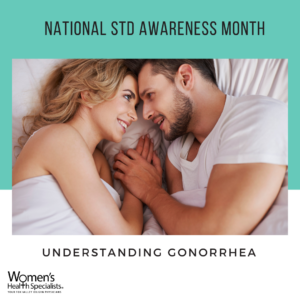 Gonorrhea is a highly contagious sexually transmitted bacterial infection. It is the 2nd most common STI in the US. Gonorrhea can be transmitted through vaginal, anal, or oral sex.
Gonorrhea is a highly contagious sexually transmitted bacterial infection. It is the 2nd most common STI in the US. Gonorrhea can be transmitted through vaginal, anal, or oral sex.
Gonorrhea bacteria can grow and multiply easily in the warm, moist areas of the reproductive tract including the cervix, uterus, and fallopian tubes in women and in the urethra of the woman and man. The bacterium can also grow in the mouth, throat, eyes, and anus.
Symptoms present 1 – 14 days after exposure however often Gonorrhea has no symptoms.
Symptoms in women: Most women have no symptoms
• Strong-smelling vaginal discharge that may be thin and watery or thick and yellow/green
• Irritation or discharge from the anus
• Abnormal vaginal bleeding
• Possibly some lower abdominal or pelvic pain/cramping
• Pain or burning with urination
• Pelvic tenderness sometimes with nausea
Symptoms in men: some men will have no symptoms
• White, yellow, or green thick discharge from the tip of the penis
• Inflammation of the testicles or prostate
• Irritation or discharge from the anus
• Urethral itching, pain, or burning with urination
Treatment: (SIP) safe in Pregnancy (NSIP) NOT safe in pregnancy
• Ceftriaxone (Rocephin): 500 mg IM if < 150 kg single dose (SIP) / 1 gm IM if > 150 kg single dose (SIP)
• If cephalosporin allergy: Gentamycin 240 mg IM in a single dose PLUS Azithromycin 2gm oral in a single dose (NSIP)
• If neither treatment is available: Cefixime (Suprax) 800 mg oral in a single dose (SIP)
• If chlamydia infection has not been excluded, treat for Chlamydia with Doxycycline 100 mg BID x 7 days (NSIF) or if pregnant Azithromycin 1 gm oral in a single dose (SIP)
Follow-up:
• Abstain from intercourse until both partners have finished treatment and abstinence should be continued for 7 days after treatment is completed
• Appointment for test of cure in 3 months
Special consideration for pregnant women:
• Test of cure 3 weeks after completion of treatment recommended for all pregnant women
• Women < 25 years or have a new or more than one sexual partner, should be retested during the 3rd trimester
• Pregnant women who are diagnosed during the 1st trimester should not only receive a test to document NEG GC after treatment, but should be retested 3 months after treatment
As we observe STD Awareness Month, we encourage everyone to take proactive steps toward prioritizing their sexual health. If you have concerns about STDs or are due for testing, we invite you to schedule an appointment with Women’s Health Specialists. Our compassionate and knowledgeable providers can offer guidance, support, and testing options to help ensure your sexual health and well-being. Don’t wait – take charge of your health today. Schedule your appointment today! Schedule on our website or call us at (920) 749-4000.